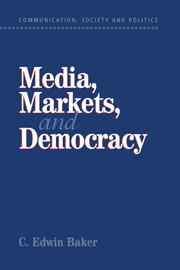11 - Trade, Culture, and Democracy
Published online by Cambridge University Press: 10 December 2009
Summary
Economic theory may give reasons to object to free trade in media products, but what about democratic theory? Maybe democratic theory has nothing in principle to say other than countries can decide what they want. Countries routinely limit their own future democratic discretion by means of treaties. When they do, the decision is generally thought to be an exercise, not an abandonment, of their democratic capacities. Any democratic objection to new treaties embodying free-trade rules must relate to something special about media products. The argument must go in at least one of two directions. First, the importance of maintaining decision-making discretion in respect to this type of good might be different than for other goods typically subject to free-trade agreements. Second, and more pointedly, democratic theory might recommend particular substantive media policies. These recommendations might require, or, alternatively, they might conflict, with free trade in these goods. Although this chapter is primarily concerned with the second possibility, I begin with the first.
MAINTAINING DEMOCRATIC DISCRETION
The preceding chapter emphasized that the public-good aspect of media products – that is, their susceptibility to nonrivalrous use – makes them different than other private goods for purposes of many economic questions. Democratic theory also notes something special about media products, about communications. While other products are often the object of political allocations, discourse or communication, of which media products are (an often commodified) part, is the substance of democratic politics. One central feature of democracy is its responsibility to make deliberative choices about its own institutional embodiments, including making changes as the society's conception of democracy undergoes refinement.
- Type
- Chapter
- Information
- Media, Markets, and Democracy , pp. 245 - 276Publisher: Cambridge University PressPrint publication year: 2001



